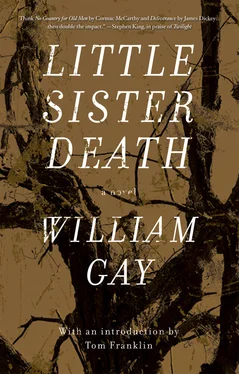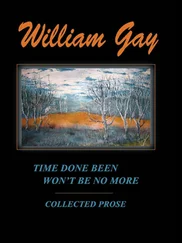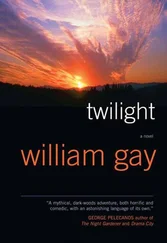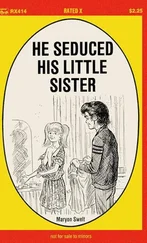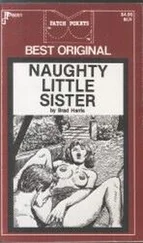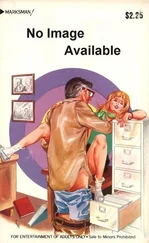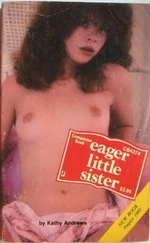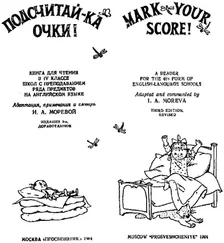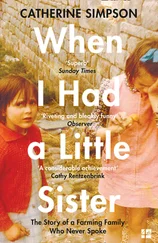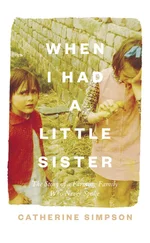What was his name?
I was just tryin to think.
Sunderson, somethin like that.
Sunderson doesn’t sound Hungarian.
Somewheres over there across the waters. It don’t matter. All I’m sayin is you find a feller wears them hornrimmed glasses and got a college degree in his hippocket and you listen to his talking about that ghost stuff real serious and you put a little more weight to it. He was a doctor of somethin, some kind of doctor.
Corrie came out of the beauty shop, Stephie behind her. They got into the pickup and it slowly backed onto the street, eased down and reparked before the A&P.
You got a nice little family there.
Thank you. How come Swaw killed his family?
Nobody every knowed. I reckon he just went crazy all of a sudden. Killed his wife in the toolshed and went in the house and commenced on his daughters. Got three out of four of them and then he shot himself. Or so they say.
You don’t think that was the way of it?
Cagle was silent a moment. I don’t know, he finally said. Somethin was botherin Owen. I drunk a beer or two with him the day he shot hisself.
What happened to the last girl?
She was put up for adoption. I imagine a thing like that happen to you when you was a kid would mess you up some.
I imagine so.
She’s hollerin at you.
Binder looked up. Corrie had come out on the sidewalk, was in fact not hollering but beckoning with an arm. I got to go tote groceries, he said. I’ll see you again.
You want to know what I think?
Sure I do.
That place is charmed.
It’s what?
Charmed. All of it, the whole fifteen thousand acres. All of it old man Beale ever had title to.
Charmed by who? Or what?
I don’t know. Do I look two hundred years old?
Well, did you ever hear or see anything out there? Funny lights, voices?
No, I never.
The old man arose and closed the knife, brushed off the front of his overalls. The soft nighweightless shavings fell plumb in the windless air, settled like shredded gossamer about his shoes. Listen, he said, somebody starts beatin on your door in the middle of the night you don’t have to get up and open the door, do ye? Your telephone rings, you can let her ring can’t ye? What I’m tellin you is you let stuff like that in. Me, let’s just say I heard somebody knockin. I left the door shut, though.
He saw with a kind of momentary and icecold clarity that the place had attracted them, had drawn them as a magnet draws iron filings, dangling its erotic past before already faulted vessels, biding its time during the tenancy of those it could not use, waiting.
You let such as that in.
The Old Beale Homeplace, 1933
Owen Swaw had a fight with his landlord over a broken double-shovel plow and found himself abruptly thrown off the place in midsummer, the crop he had planned to share in contention and hard feelings all around. Swaw had a wife and four daughters that ranged from grown to nearly grown.
Lawed off a place we lived on four year, the woman said, bitterly. Her name was Lorene. Lawed off and not even by a sheriff. Lawed off by a man a sheriff sent. If I’da had sons stead of daughters I’da never been throwed off to begin with. Them as can done gets em, she said. Them as don’t makes do as best they can.
Swaw was used to hard times. He had known no other. He was used to field peas and cornbread when he had them and he was used to not having it too. He was used to shotgun shacks with cracks you could have thrown a good-sized housecat through and floors through whose cracks a man could watch his chickens scratching for worms, if he was lucky enough to possess any chickens. In 1933 a man on Swaw’s status level was a good deal more likely to possess a housecat than he was a chicken, and Swaw was no exception.
He was used to bonechilling cold in the wintertime with everyone crowded around a tin woodstove trying their best to keep it warm and kicking through snow to cut wood that was frozen to the heart. A sharecropper didn’t have time to cut his wood in the summertime. In July and August he was used to heat that wouldn’t abate even at night, when you’re exhausted but awake, feeling the droplets of sweat sliding across your naked ribs, wanting to cry out Great God is the place afire, listening through the thin board walls to the woods just outside your door, the whippoorwills and crickets and owls, and knowing that day was coming and another day’s work but the harder you tried to sleep the more elusive it became.
He wasn’t one like the colored man in the story. A white man and a colored man went hunting together and killed a turkey and a buzzard. At the end of the day they divided up the game. Well, the white man said, it’s all the same to me. You take the buzzard and I’ll take the turkey or you take the turkey and I’ll take the buzzard. The colored man considered this for a time. Well, he said. It shore sounds fair but seems like I wind up with the buzzard most of the time.
Swaw was used to getting the buzzard, and he was pretty sure he had it now. He was getting more of it every day, piece by scrawny piece, from his wife and four squabbling daughters.
Then luck stepped in, a commodity with which Swaw had barely a passing acquaintance. Swaw had a friend who had one of the few steady jobs in Limestone County. He was helping log the timber of the Beale place. This friend’s name was Charlie Cagle and he told Swaw he could get him a few days’ work cutting timber. Cagle even let them store their household plunder, such as it was, in his barn and sleep on mattresses in an empty back room of his house.
They were logging off the original homeplace and Swaw had never seen such timber. The land had never been cut over, and these were enormous beech trees of such girth you barely had room to pull a crosscut saw back and forth, trees you’d spend half a morning felling that sounded like thunder when they finally came down.
In the thirties you worked long hours, and even in the summer the sun would be sinking when they came out with the mules past the old Beale houseplace, out of the woods and across a sloping fallow field. There was a knoll above the houseplace, and this was where the old Beale graveyard was. Once they had stopped and walked among the old graves, oblong declivities in the earth, each marked by leaning old-timey stones, marble lambs at repose and stark spires and graven angels. The hill dropped off then and there were the twin chimneys rising out of the riot of sassafras and sumac bushes like chimneys flanking an invisible house, a house no longer here. The great pear trees loaded, Swaw noticed, with green pears bigger than his feet. Swaw guessed you could have kicked your way through the brush and followed the line of the foundation rocks, but he had no desire to do so. He hadn’t lost a damn thing there and he’d bet there were copperheads in there big as a man’s legs.
The place gave him the all-overs anyway, but he would have been hard put to explain why. There was just a curious quality about the place. He had heard the wild tales from the time he was a kid but he didn’t put any stock in them, and besides, that wasn’t what he dreaded anyway. For one thing, it just never seemed to be light enough to suit him there, or perhaps that was because it was usually dusk when he passed it. For another, the place reminded him somehow of a church or some other sacred spot. A place where something solemn and momentous had happened a long time ago, steeped in a kind of patient waiting for it to happen again.
But he couldn’t put it into words exactly. All he knew was he didn’t like going past it and if there had been another road out he would have taken it, let Charlie Cagle laugh at him all he damn pleased. So going out he wouldn’t look too close. He would walk along, weary, feeling the chambray workshirt stiffening with drying salt against his back, concentrate on the sounds the mules’ hooves made over the stony field and their trace chains chiming halfmusically in the twilight, and he would be glad Charlie was walking along the wagon road with him.
Читать дальше
